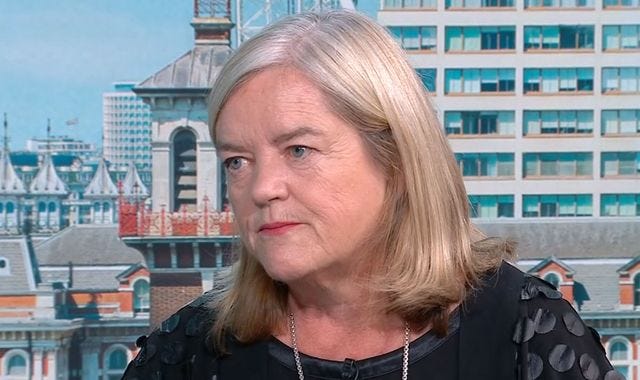Why Are We So Bad at Grasping Difficult Things?
The British State's Dependency On Louise Casey
If you’re in London THIS FRIDAY EVENING then come along to the offices of my esteemed publisher Faber to hear me talk John & Paul with the brilliant novelist Rebecca Watson. This will be a very fun evening. There will be cocktails. Tickets available here.
Catch-up service:
This Charming Man
5 Reasons There Won’t Be an AI Jobs Apocalypse
Why Is TikTok Rocket Fuel For Populists?
We’re All Viennese Now
Why Am I At My Lowest In The Middle of the Night?
Seven Features Of Post-Literate Politics
This week, Baroness Casey delivered her report on grooming gangs in England and Wales. She called for a national public inquiry into the scandal, something that the government had been keen to avoid, since the Labour Party doesn’t want to dwell on the failures of its own local authorities or further alienate Muslim voters. In January, besieged by a Ketamine-fuelled Elon Musk, Starmer said he was against a new inquiry, but commissioned the Baroness to look into it, just to move the story on. Now that she supports an inquiry, so does he. You don’t argue with Casey.
Louise Casey might be the most trusted and capable official in the country, a one-woman institution to which political leaders pass the buck when the buck is too hot to handle. How can I explain her to The Ruffian’s overseas readers? She’s something like the Winston Wolf of British social policy. When a government of either party needs to confront some messy, potentially toxic problem that nobody else can or will grasp - especially involving voters on the lowest rungs of society - it calls on this former-charity-leader-turned-civil servant to do it for them. (Casey was made a crossbench peer in 2020).
In 1999 Tony Blair gave her the task of tackling the homeless problem; she made more progress on it than anyone before or since. Blair then put her in charge of his anti-social behaviour initiatives, a centrepiece of his second and third terms. Gordon Brown commissioned a review of the criminal justice system from her. David Cameron put her in charge of his Troubled Families Initiative, which was criticised at the time but proved to be more effective than most government programmes aimed at the worst off. It was also under Cameron that Casey was first asked to investigate the grooming gangs scandal, a decade ago. Theresa May (when she was Home Secretary) and Boris Johnson asked her to do some heavy lifting too, May on immigrant integration and Johnson on homelessness during the pandemic, and on the culture of the Metropolitan Police.
Unlike Winston Wolf, Baroness Casey doesn’t operate in the shadows. She is not exactly famous but she now has a high-enough public profile to be a political force in her own right. This week she was in TV studios explaining why she has concluded that the grooming gangs scandal still hasn’t been properly metabolised by the British system, and why a national inquiry is a crucial first step towards ensuring it can’t happen again (there have been several inquiries already but none which have been able to overcome the self-preserving instincts of local authorities).
Casey seems relaxed about being in the spotlight - perhaps even enjoys it. In interviews she is forthright and confident in her positions, as you’d expect, given her expertise and experience with this issue. You could argue she veered out of her lane when criticising the Tory front bench for its reaction to her report. But by and large she uses her political capital responsibly, which is why she’s still trusted across the spectrum. In the cynical world of politics, I’ve never heard anyone seriously cast doubt on her commitment to public service. She isn’t afraid to breach norms of political correctness, but she does so in order to tell the truth rather than score points.
We’re lucky to have her. My question is this: why aren’t there more Louise Caseys? She is talented, yes, but her abilities should not be so unique that they can’t be replicated. To put it another way, what does it say about our governing class that, for a quarter of a century, successive governments have leaned so heavily on this one official? I think it tells us three things.




